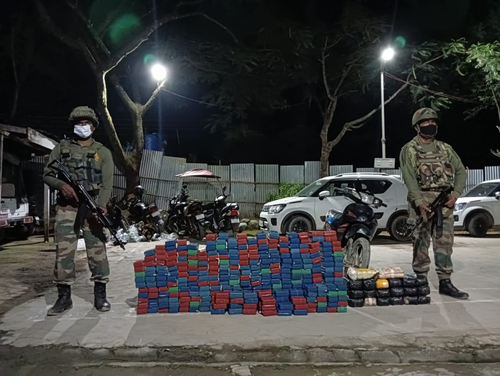America
India-US alliance tightens grip on transnational drug networks

Washington/New Delhi, Nov 28
India and the United States' expanding counter-narcotics cooperation demonstrates how shared vulnerabilities can evolve into long-term alliances, disrupting transnational drug networks, protecting public health, and strengthening economic resilience in both countries, a report highlighted on Friday.
It added that the elevation of India-US Counternarcotics Working Group to annual engagements — currently preparing for its sixth meeting — has led to major seizures, arrests, and dismantling of networks, while laying the foundation for tighter precursor chemical regulation and broader harm reduction measures.
“India’s move to seek deeper anti-narcotics cooperation with the US marks a strategic shift within its foreign policy — recognising that the accelerating threat from international drug networks now directly impacts both national security and societal health across borders. The operational collaboration between the two nations has intensified considerably in recent years, dismantling major transnational drug operations and fostering robust institutional mechanisms,” a report in India Narrative detailed.
“This partnership’s significance lies in its ambition to evolve from tactical interdiction to a multifaceted, forward-thinking drug policy framework, addressing not just supply but also public health, regulatory integrity, and socio-economic fallout,” it added.
Since establishing the Counternarcotics Working Group in 2020, India and the US have moved beyond traditional enforcement cooperation, paving the way for annual meetings, expanded agendas, and increased information-sharing capabilities.
“The fifth meeting, held in October 2024 in New Delhi, saw agreements to broaden collaboration, especially targeting synthetic drugs like fentanyl and amphetamine-type stimulants, and controlling precursor chemicals. These strategic areas are critical, given India’s position as a major pharmaceuticals producer and exporter, and the global proliferation of synthetic opioids,” the report stressed.
On Wednesday, while responding to a question on counter-narcotics cooperation during a weekly media briefing, Ministry of External Affairs (MEA) spokesperson Randhir Jaiswal said, “We have a very strong mechanism of sharing information between the United States and India, and these have resulted in key seizures and arrests. Let me also tell you that joint operations have been conducted which has led to dismantling of major transnational networks. So, it's a very good area of cooperation and we want to further strengthen our joint fight against narcotics.”
The report emphasised that with synthetic opioids such as fentanyl spreading globally, sustained joint intelligence, capacity-building, and policy frameworks can help protect millions from addiction and place both countries at the forefront in a 21st-century drug policy model that prioritises prevention, enforcement, and treatment.
“Ultimately, this mutual commitment promises safer communities, thriving pharmaceutical sectors, and a blueprint for multilateral action against evolving threats,” it noted



































